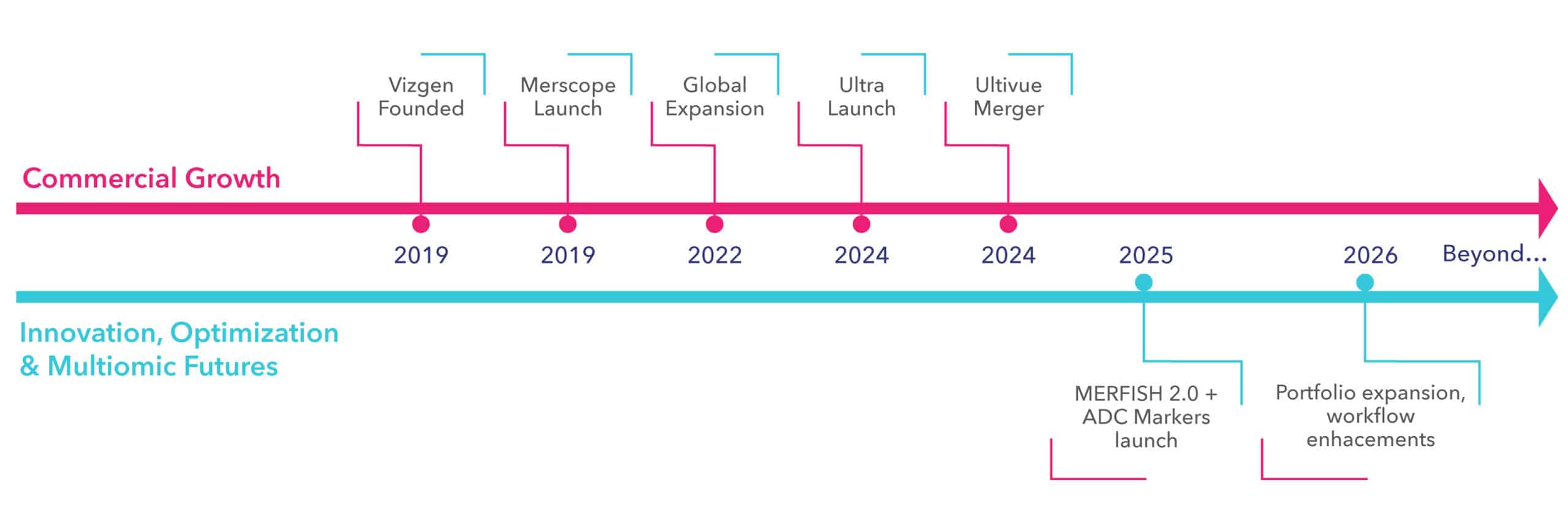About Us
See the Whole Picture of Biology
Vizgen is redefining how scientists see and understand biology. As a leader in spatial multi-omics, we deliver single-cell, spatially resolved data with unmatched resolution, accuracy, and depth, with AI-powered analysis, enabling researchers, clinicians, and biopharma teams to move more quickly from discovery to detection.


Our Values
Our values guide how we innovate, collaborate, and serve the scientific community. Our team is fueled by deep scientific passion and relentless curiosity, striving to understand biology more completely. We place customer success at the heart of everything we do, knowing that our success is measured by the insights we help our customers unlock.
We believe progress happens through collaboration, accountability, and purpose-driven leadership. By holding ourselves to the highest standards of quality and transparency, we create a culture of excellence that fuels discovery and advances human health around the world.


Award Winning Innovation in Biotech
Vizgen continues to lead the evolution of spatial biology. Recognized as the #1 private spatial biology company by GEN and honored as Overall Biotech Company of the Year by the BioTech Breakthrough Awards, Vizgen is celebrated globally for advancing single-cell, multi-omic discovery.
200+
180+
200+

MISSION
We help advance human health by equipping researchers with spatial biology tools that reveal biology in its true context and accelerate discoveries that lead to better diagnostics and therapies.

VISION
A world where every disease can be precisely mapped and understood at the molecular level, creating clear paths to cures and transforming how medicine is discovered and delivered.

Our History
Founded in 2019 with a vision to revolutionize biological research and improve human health through spatial genomics, Vizgen quickly established itself as a pioneer in the field. Building on MERFISH® technology exclusively licensed from Harvard University, the company launched the MERSCOPE® platform to map RNA and protein molecules with subcellular precision.
In 2024, Vizgen merged with Ultivue, uniting expertise in single-cell spatial genomics and multiplex proteomic biomarker detection to deliver a comprehensive spatial multi-omics platform. With Ultivue’s legacy in ultra-sensitive InSituPlex® assays and rapid assay deployment, the combined organization is poised to accelerate discovery and drive precision medicine forward.
Our Facilities
Vizgen’s facilities reflect our commitment to innovation, precision, and scientific excellence. Equipped with state-of-the-art instrumentation and collaborative research spaces, they serve as hubs for advancing spatial biology. Our teams in Cambridge and Waltham, Massachusetts, and around the world drive breakthroughs in spatial genomics and proteomics, supported by integrated laboratories that foster discovery, collaboration, and technological advancement.


“Using MERFISH technology, researchers at the Allen Institute were able to gather cellular-resolution spatial transcriptomic data that advanced us significantly closer toward our goal of creating a taxonomy of cell types and a description of their connectivity within brain circuits – laying the groundwork to one day understanding how brain circuits function. In the hands of the research community, I believe that MERSCOPE will be a powerful tool for standardizing the way we characterize different cell types, not just in the brain, but also in the rest of the body, ultimately bringing a deeper level of understanding to all life science research .”
Hongkui Zeng, Ph.D.
Executive VP & Director of the Allen Institute for Brain Science

“MERSCOPE is a game changer- it’s a giant leap from customer-built microscopes that only work in a few labs to a system that’s broadly adaptable. It’s really transformative because it allows molecular labs without experience with optics to use the system and generate high quality data.”
BING REN, PHD
UCSD
Professor of Cellular and Molecular Medicine
Member, Ludwig Institute for Cancer Research

Our Culture
Curiosity, innovation, and collaboration are at the heart of our culture. United by a shared mission to transform how the world understands biology, our global team brings together experts in genomics, proteomics, engineering, and data science. We foster an environment that values creativity, accountability, and continuous learning, where every idea contributes to advancing discovery and improving human health.